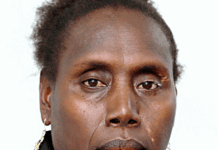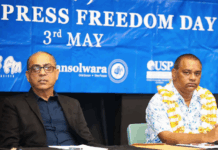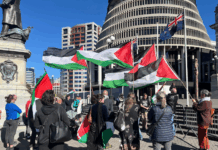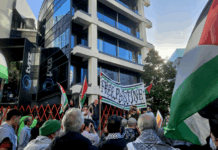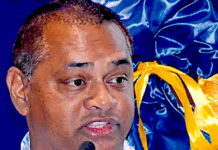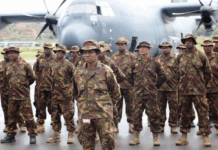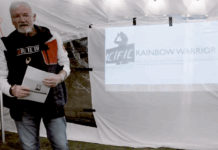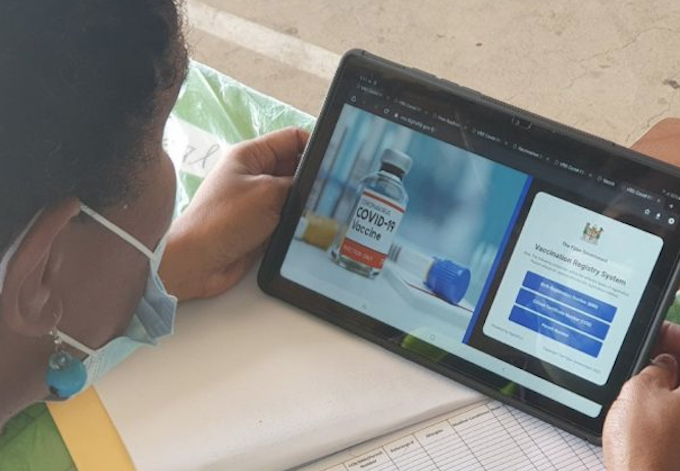
By Josefa Babitu in Suva
Fiji’s fight against the covid-19 pandemic seems to have no light at the end of the tunnel after the Pacific nation has recorded 636 cases and six deaths in the past day alone.
Yesterday’s number makes 5776 people battling the virus in total while the Health Ministry expects more cases in the coming days.
Fiji, with a population of about 900,000, is fighting the delta variant (originally from India) of the virus that has crippled its healthcare system in just less than four months.
- READ MORE: SODELPA leader blasts PM, Attorney-General over Fiji covid ‘recklessness’
- Covid-19: Six deaths and 636 news cases reported in Fiji
- Fiji mortuary full, public frustration, confusion rife over covid-19
- Fiji reports record 522 new cases of covid-19 – three more deaths
- Sayed-Khaiyum leading Fiji into chaos, says women’s crisis centre leader
- Backgrounder on the delta variant
- Other reports on the Fiji covid crisis
The outbreak began in April at a funeral attended by more than 500 people and among the crowd was the carrier of the virus who worked as a maid in a quarantine facility in Nadi.
In early May, Health Secretary Dr James Fong said the second wave of the virus would be the greatest test of Fiji’s healthcare system that it has ever faced.
“Lives are at stake, sacrifices must be made, and every Fijian’s commitment is needed. The virus is insidious, it is unrelenting. All it takes is one unknown case in our community to spark an explosion of cases across the country,” he said.
He made the comments after two of Fiji’s doctors contracted the virus from a patient who displayed symptoms of the virus but had refused to be tested for covid-19 (he later tested positive), just days after the virus entered local communities.
‘Red flag for widespread transmission’
“From a statistical standpoint, ICU cases –– like the one we now have –– may be a red flag for widespread transmission. Essentially, it tells us that there are likely many more cases of the virus out there,” Dr Fong said.
Fiji has locked down some parts of Viti Levu for more than once as a drastic measure to contain the virus. It also has a 6pm to 4am curfew for the capital Suva and Nausori corridor where the cases are surging and an 8pm to 4am curfew in other parts of the country.
This month, the virus is in the country’s Center for Disease Control, Correction Service, various government ministries including Health, Economy, Agriculture, Defence and even police to name a few.
Some members of the public have called for a “28 days of straight lockdown for the whole of Viti Levu” — Fiji’s main island. However, the government said this would be an economic loss.
Prime Minister Voreqe Bainimarama told Fijians last month: “It is easy to call for a lockdown if you don’t work at a factory that might permanently leave Fiji if they must shut down completely for 28 days; the garment factories and call centres that cannot serve overseas clients will lose those contracts –– and the jobs they support –– forever.
“And businesses, large and small, that thrive because of this economic activity could shut forever as well.
“Our plan is reasonable, it is tolerable and it is built for the long-haul. And we will stick with that plan. Rather than subject the nation to a far more severe socioeconomic situation, we will continue to care for those in-need with the resources we have.”
Average cases increase
In a statement last night, Dr Fong said the seven-day average of new cases per day has increased to 429 cases per day or 485 cases per million population per day.
“We continue to see people with severe COVID-19 dying at home or coming to a medical facility in the late stages of severe illness and dying within a day or two,” he said.
“Severe covid-19 is a medical emergency and a delay in receiving appropriate medical treatment may result in a higher risk of death.
“As expected, with the increasing case numbers we are also seeing increasing numbers of people with severe disease and more deaths in the Suva-Nausori containment zone.
“There have been 31 new recoveries reported since the last update, which means that there are now 5776 active cases in isolation. There have been 7079 cases during the outbreak that started in April 2021.”
The country has recorded a total of 7149 cases in Fiji since the first case was reported in March 2020, with 1,318 recoveries.
The death toll for covid-19 patients has increased to 39 from 33 ending at 8am yesterday.
More cases expected
With more cases expected in the future, Fijians have turned to home remedies as a preventative measure and cure from the deadly virus — one being steam inhalation therapy.
“Steam inhalation therapy (kuvui) is commonly used as a home remedy to provide relief from congested nasal passages, and symptoms of cold or inflamed sinuses, or other mild COVID-19 symptoms,” said Dr Fong.
“However, steam therapy is not a treatment for severe covid-19. Severe cpvid-19 is a medical emergency, and relying completely on home remedies can delay urgent medical treatment.”
Fiji’s only hope in dealing with this outbreak is the AstraZeneca vaccine donated by Australia and New Zealand.
Dr Fong said 324,462 adults in Fiji had received their first dose of the vaccine and 54,737 had received their second doses.
Percentage-wise this means that 55 percent of the target population has received at least one dose and 9.3 percent are now fully vaccinated nationwide.
“Because of vaccines and because we now know more about covid, the world’s fight against this virus has changed, and so must our strategy,” Bainimarama said.
“We will get through this current ordeal by an intelligent and targeted application of measures to contain the spread until we get enough of us vaccinated to achieve herd immunity.”
The only hope right now for Fiji is to vaccinate 80 percent of its population before some restrictions are relaxed.
Josefa Babitu is a final-year student journalist at the University of the South Pacific (USP). He is also the current student editor for Wansolwara, USP Journalism’s student training newspaper and online publication. He is a contributor to Asia Pacific Report.


